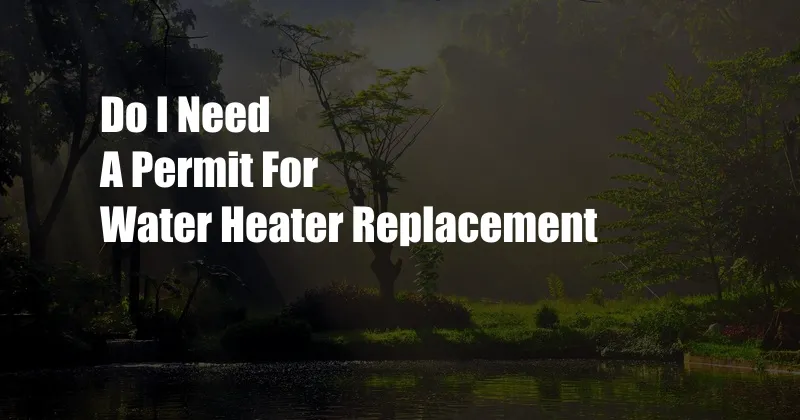
Do I Need a Permit for Water Heater Replacement?
As a homeowner, the thought of replacing your water heater can be daunting. Amidst the concerns about costs and safety, one question that may linger in your mind is whether you need a permit for the job.
To ease your worries, let’s delve into the topic and understand the permit requirements for water heater replacement. We’ll also explore the latest trends and developments in the industry, providing you with valuable insights and expert advice.
Permits: Navigating the Legal Landscape
Whether or not you need a permit for water heater replacement depends on the regulations in your specific location. In most cases, local building codes require a permit for any plumbing work that involves altering the water supply or drainage system of your home.
The permit ensures that the work is done according to the established safety and building standards. It serves as a legal document that verifies the installer’s qualifications and adherence to code requirements. Obtaining a permit is essential to avoid penalties and potential safety hazards.
Exceptions and Considerations
There may be exceptions to the permit requirement in certain circumstances. In some jurisdictions, a permit is not necessary if you are replacing an existing water heater with a unit of the same type and size. However, it’s always advisable to check with your local building department for specific regulations.
Additionally, if you have a licensed plumber performing the work, they may be able to pull the necessary permits on your behalf. It’s essential to ensure that the plumber is licensed and insured to guarantee the quality and safety of the installation.
Latest Trends and Developments
The water heater industry is constantly evolving, with new technologies and innovative features emerging.
One significant trend is the rise of high-efficiency water heaters. These models use less energy to heat water, reducing your energy consumption and utility bills. Tankless water heaters are also gaining popularity as they provide an endless supply of hot water on demand. These advancements offer homeowners greater comfort and cost savings.
Expert Insights
When it comes to water heater replacement, it’s crucial to seek expert advice from qualified professionals.
- Choose a licensed and experienced plumber with a proven track record.
- Consider your hot water usage patterns and select a water heater with an appropriate capacity.
- Explore energy-efficient options to reduce your energy consumption and save money in the long run.
- Follow the manufacturer’s instructions carefully during installation and maintenance.
- Regularly maintain your water heater to ensure its longevity and performance.
Frequently Asked Questions
-
Q: How do I know if I need a permit for water heater replacement?
A: Check with your local building department for permit requirements.
-
Q: Can I replace a water heater myself?
A: It’s highly recommended to hire a licensed plumber for safe and proper installation.
-
Q: How often should I replace my water heater?
A: The lifespan of a water heater typically ranges from 8 to 12 years.
-
Q: What are the benefits of high-efficiency water heaters?
A: Reduced energy consumption and lower utility bills.
Conclusion
Understanding the permit requirements and staying abreast of the latest trends in water heater replacement is essential for homeowners. By following the expert advice and diligently maintaining your water heater, you can ensure a reliable and efficient hot water supply in your home.
If you have any further questions or require professional assistance, don’t hesitate to contact a qualified plumber in your area. They can provide you with customized advice and help you navigate the permit process seamlessly.
Are you interested in learning more about water heater replacement and other home improvement topics? Explore our website for a wealth of informative articles, tips, and expert insights.